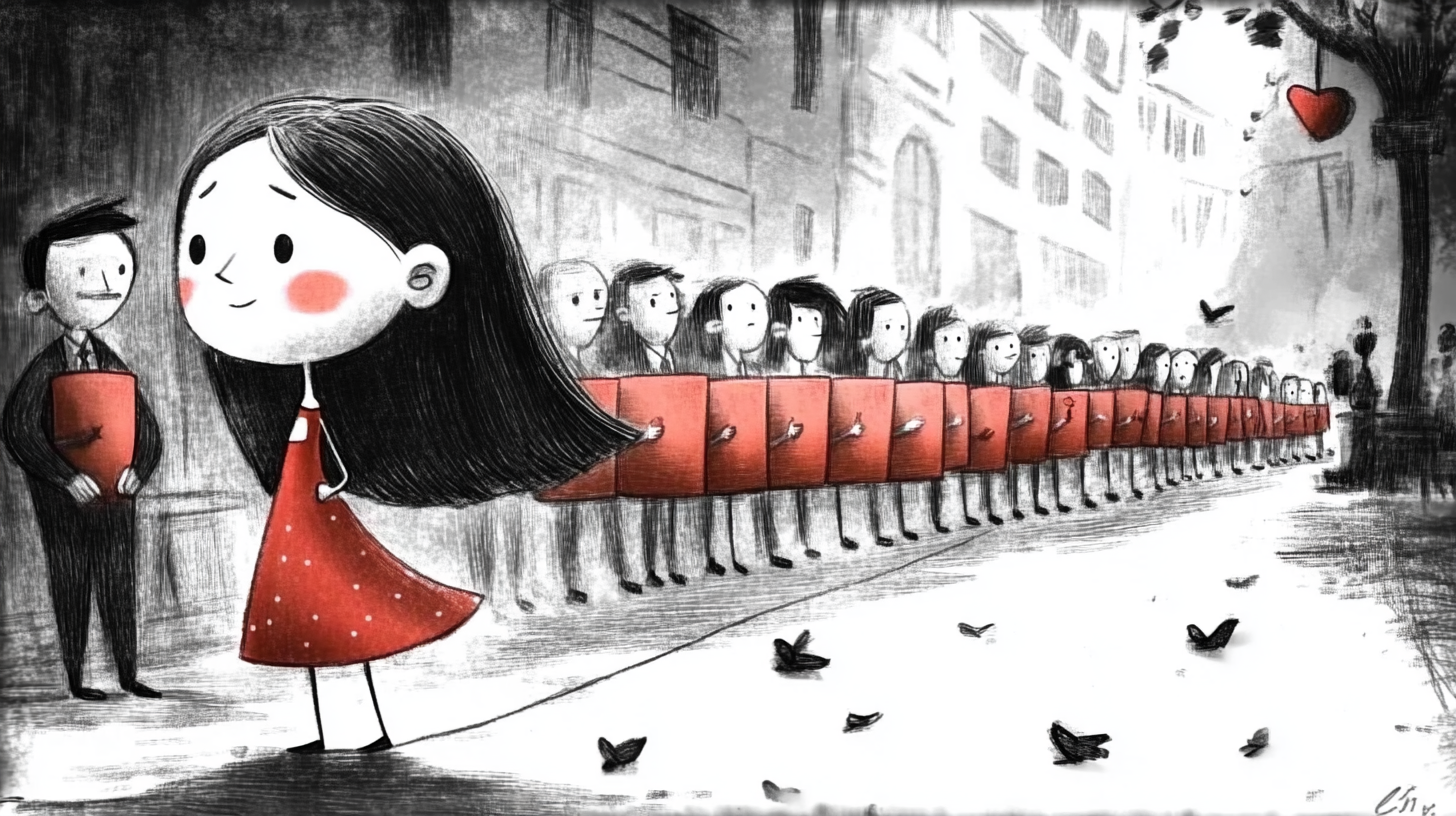Fellow means someone who is in the same group or situation.
以下は英単語 “fellow” に関するストーリー型学習コンテンツです。まずは大枠の意味を理解して最後の文章で確認しましょう。
主な意味(main meaning)
| 品詞 | 発音記号 | 意味 | 例文 |
|---|---|---|---|
| 名詞 | /ˈfɛl.oʊ/ | 仲間、同僚、同じグループの人 | She helped her fellow students during the project. |
| 形容詞 | /ˈfɛl.oʊ/ | 同じ立場の、同じ種類の | He greeted a fellow traveler at the station. |
語源(etymology)
「fellow」は古ノルド語の felagi(お金を共有する人)に由来し、「一緒に何かをする仲間」のイメージが根底にあります。
類義語(synonyms)
| 類義語 | 例文 |
|---|---|
| companion | He traveled with a trusted companion. |
| colleague | She had lunch with her colleague from the office. |
| peer | Students often learn well from their peers. |
| partner | He is my business partner. |
| comrade | Soldiers supported their comrades in battle. |
「fellow」と「colleague」はどちらも「同僚」「仲間」という意味を持ちますが、ニュアンスと使い方に違いがあります。
| 項目 | fellow | colleague |
|---|---|---|
| 基本の意味 | 同じ立場・状況にある人(広い意味) | 同じ職場の人(特に仕事の関係) |
| 使用範囲 | 学校・職場・旅行など多様な場面 | 主に職場などプロフェッショナルな場面 |
| 感情的なつながり | やや親しみや共感を含むことが多い | 感情的なつながりは含まれないことも多い |
| 例:学生同士 | fellow student | (通常は使わない) |
| 例:職場の同僚 | fellow worker, fellow employee | colleague |
| 例:同じ旅人 | fellow traveler | (使わない) |
fellowは「共通点を持つ仲間」で、仕事以外の文脈でも使えます(学校、旅、国など)。
colleagueは「仕事上の同僚」に特化して使います。
「fellow」の方がカジュアルで親しみやすく、「colleague」はフォーマルで中立的です。
反義語(antonyms)
| 反義語 | 例文 |
|---|---|
| stranger | A stranger walked into the room quietly. |
| enemy | They had to face their enemy with courage. |
コロケーション(collocations)
| コロケーション | 例文 |
|---|---|
| fellow student | She became friends with her fellow students quickly. |
| fellow worker | He respects his fellow workers. |
| fellow citizen | We should care for our fellow citizens. |
| fellow passenger | A fellow passenger helped her with her bag. |
| fellow human being | We must treat every fellow human being with kindness. |
2項表現(binomials)
| 2項表現 | 例文 |
|---|---|
| friend and fellow | He is both a friend and fellow at the university. |
| partner and peer | As my partner and peer, she supported me. |
英語ストーリー(english story)
Title: A New Fellow at Work
Tom had just started a new job at a travel agency. On his first day, he was nervous, but he soon met Lisa, a fellow employee who welcomed him warmly. “Don’t worry,” she said. “All your fellow workers are kind.”
Tom quickly became friends with his fellow colleagues, especially during lunch breaks. They shared jokes and helped each other with work. One day, Tom had a difficult task. His companion Lisa stayed late to help him. “You’re not alone,” she smiled.
During a company trip, Tom sat next to a fellow passenger on the bus who turned out to be from another office. “We are partners and peers now,” the man said.
Later that week, Tom gave a speech. “It’s a great honor to work with such amazing fellow human beings. Let’s continue to support one another as friends and fellows.”
Tom realized that work wasn’t just about tasks. It was about the people — his comrades, partners, and fellow citizens of the same workplace.
和訳
タイトル:職場の新しい仲間
トムは旅行会社で新しい仕事を始めたばかりだった。初日は緊張していたが、すぐにリサという**仲間(fellow)の社員に温かく迎えられた。「心配しないで」と彼女は言った。「あなたの同僚(fellow workers)**はみんな親切よ。」
トムはすぐに**同僚たち(fellow colleagues)**と仲良くなり、特に昼休みに冗談を言い合いながら助け合った。ある日、トムは難しい仕事を任された。**仲間(companion)**のリサは残業して手伝ってくれた。「あなたは一人じゃないよ」と彼女は微笑んだ。
会社の旅行中、トムはバスで隣に座った**乗客仲間(fellow passenger)と話した。その人は別のオフィスから来ていて、「今や私たちはパートナーであり同僚(partners and peers)**ですね」と言った。
その週の後半、トムはスピーチをした。「素晴らしい**仲間たち(fellow human beings)と働けるのはとても光栄です。これからも友人であり仲間(friends and fellows)**として、お互いを支えていきましょう。」
トムは、仕事とはタスクだけでなく、人とのつながりだと実感した。仲間(comrades)、パートナー(partners)、そして職場という社会の**一員(fellow citizens)**として。



コメント